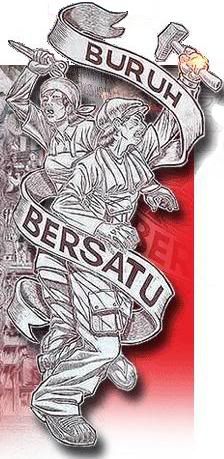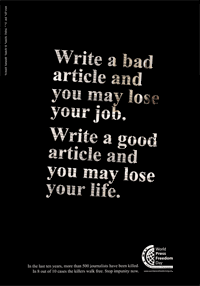 Klik sini untuk membeli Buku dan VCD Keadilan terbaru !
Klik sini untuk membeli Buku dan VCD Keadilan terbaru !

Bangkitlah Kaum Buruh & Petani
Menentang Ekstremis & Hipokrits!

~ faisal mustaffa online ~
Sunday, April 26, 2009
Further restrictions on peaceful assembly in Singapore
One of the paintings being displayed at Singapore Bianalle May 2008
On 13 April Singapore ’s parliament passed a new Public Order Act, which further restricts the human right to freedom of peaceful assembly and enhances policing powers to the exclusion of adequate safeguards to prevent abuse.
The government stated that the Act was needed in advance of the Asia Pacific Economic Cooperation (APEC) Summit to be held in Singapore during November, when heads of state from member countries will meet. It claimed that such legislation was needed to combat the threat of terrorist acts during the summit.
Amnesty International recognizes the security concerns and the challenges of policing such a large event. However, this development has the potential of further constricting freedom of peaceful assembly in Singapore , which is already compromised. This law should be amended to ensure full compliance with international human rights standards.
The law complements and strengthens provisions of existing legislation, including the Public Entertainments and Meetings Act (PEMA) and the Miscellaneous Offences Act (MOA) which have been used previously to suppress peaceful demonstrators.
These include prominent opposition leader, Dr. Chee Soon Juan, the Secretary-General of the Singapore Democratic Party. He was sentenced in November 2006, under the Public Entertainments and Meetings Act, to five weeks in jail after refusing to pay a S$5,000 fine for speaking in public without a permit, prior to the country's general election in May 2006.
Amnesty International calls on the Singapore government to meet its legal obligations under Article 14(1) of the Singapore Constitution to preserve freedom of speech and expression; the right to assemble peaceably and without arms; and the right to form associations.
Amnesty International also calls upon Singapore to abide by Article 19 of the Universal Declaration of Human Rights (UDHR) which states that, “Everyone has the right to freedom of opinion and expression; this right includes the freedom to hold opinions without interference and to seek, receive and impart information and ideas through any media and regardless of frontiers”. While this right, as well as the right to peaceful assembly (in Art. 20(1) of the UDHR) may be restricted for purposes such as national security or public order, these restrictions can only be applied narrowly and to the extent necessitated by the specific circumstances.
A law which defines as few as two persons moving “substantially as a body of persons” in order to show opposition or support to somebody’s view, publicise a cause or commemorate an event (Sec. 2(1) of the Act) - as “a procession” which needs a permit and on which restrictions may be applied cannot be seriously considered as falling within internationally accepted limitations on these rights.
The circumstances under which permits may be denied are stated in Section 7(2), using vague language that can be broadly interpreted. This includes where there are reasonable grounds for believing that the proposed assembly or procession may “create a public nuisance” or “cause feelings of … ill will … between different groups in Singapore ”.
The government can, under Sections 12, 25 and 28 of the Act, give enhanced powers to the police by declaring an event to be a prohibited one. This would enable police to stop and search any person who is entering or about to enter such an area. They may also search any person who is already in this area. They may question an individual’s reason for wanting to enter a venue and also deny entry to such a venue. Failure to comply will subject the individual to a fine and imprisonment. Amnesty International is concerned that these powers are excessive and open to abuse, which could result in violations of the rights to privacy and freedom of movement, as well as arbitrary detention.
Under Section 40 of the Act, police may arrest individuals without a warrant for contravening any of the Act’s provisions, which would include anyone who “assists or promotes… any assembly or procession” (Sec. 3(1)(a) of the Act).
Rather than restricting further the rights to freedom of speech and peaceful assembly, Singapore should revise its laws and policies to accord with international human rights standards, including by ratifying international human rights treaties such as the International Covenant on Civil and Political Rights. The government should also seek guidance from international human rights monitoring bodies and experts on maintaining security while respecting and protecting human rights.
Background
Singapore imposes significant restrictions on freedom of expression and assembly, particularly on critics of the government, the media, and peaceful demonstrations. In 2008, 18 activists and members of the opposition Singapore Democratic Party faced charges for holding unauthorised protest marches against the rising cost of living. In October 2008, already bankrupt Secretary-General of the opposition Singapore Democratic Party, Dr. Chee Soon Juan and activist Chee Siok Chin were ordered to pay S$610,000 (approximately US$406,000) in defamation damages to current and former government leaders. They were subsequently sentenced to prison for contempt of court after criticising the conduct of their trial. Although they have since been released, as bankrupts they were barred from seeking parliamentary seats or leaving the country without permission.
Me at Singapore Art Museum
Labels: Amnesty International, freedom of assembly





0 Comments:
Post a Comment
<< Home